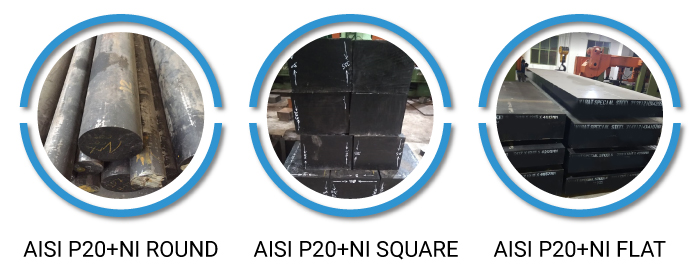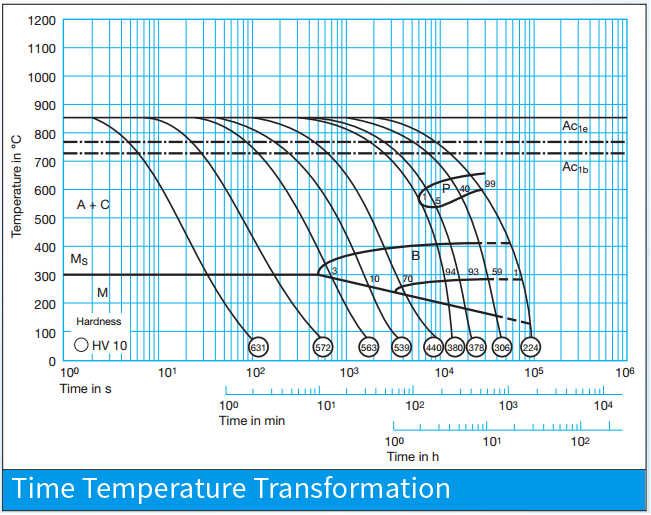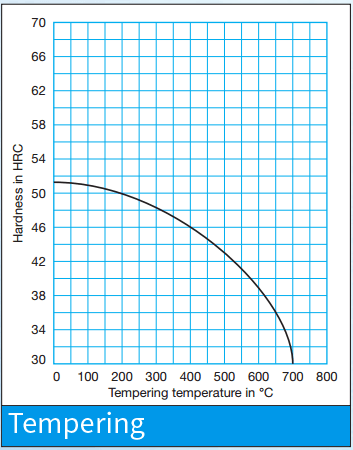| C | Si | Mn | P | S | Cr | Mo | Ni |
|---|---|---|---|---|---|---|---|
| 0.35 - 0.45 | 0.20 - 0.40 | 0.60 - 1.00 | 0.03 | 0.03 | 1.80 - 2.10 | 0.15 - 0.25 | 0.90 - 1.20 |
AISI P20+Ni is specially used for Plastic injection die moulds. The characteristics of a material are right sharpening, photo-etching properties with high purity and good homogeneity. AISI P20+Ni is upgraded version of plastic mold steel 0f 2311, which normally supply in Pre hardened condition. Hardness in as supplied condition 280-320 HB with having uniform hardness. The additional nickel content of 1 % increases through hardening. It has good machinability, suitable for Texturing, fine polishability, adequate corrosion resistance, vacuum-degassed steel.
AISI P20+Ni is with High Hardness 360-400 BHN and increase alloy elements to get extra life and outstanding polishing.
AISI P20+Ni steel is a type of plastic mold steel that is similar to DIN 1.2738 / P20+Ni Tool Steel. The alloying elements for hardness and toughness include nickel, chromium, and molybdenum. P20+Ni tool steel is intended specifically for the plastic mold industry, particularly for large steel mold components.
AISI P20+Ni tool steel is often provided pre-hardened/quenched and tempered in the 280 - 320 HB hardness range. This makes it a great choice for applications involving high-temperature settings and difficult mechanical conditions.
AISI P20+Ni steels have superior polishability compared to 1.2312 (AISI P20+S) and better machinability. To enhance the hardness and wearability of the mould surface material , it can be treated with nitrogenation and flame hardening. P20+Ni steel is melted in an electrical furnace and refined using a VOD or DH equipment.P20+Ni steel is a type of plastic mold steel that is similar to DIN 1.2738 /AISI P20+Ni Tool Steel. The alloying elements for hardness and toughness include nickel, chromium, and molybdenum. P20+Ni tool steel is intended specifically for the plastic mold industry, particularly for large steel mold components.
AISI P20+Ni tool steel is often provided pre-hardened/quenched and tempered in the 280 - 320 HB hardness range. This makes it a great choice for applications involving high-temperature settings and difficult mechanical conditions.
AISI P20+Ni steels have superior polishability compared to 1.2312 (AISI P20+S) and better machinability. To enhance the hardness and wearability of the mould surface material , it can be treated with nitrogenation and flame hardening. P20+Ni steel is melted in an electrical furnace and refined using a VOD or DH equipment.
Virat Special Steels is the largest stockiest and supplier of AISI P20+Ni Steel in flat, square and round bar. We provide steel in all sizes as your requirements. AISI P20+Ni die steel is available in flat, square and round shape. Consult our team who will assist you for AISI P20+Ni steel query.

AISI P20 +Ni is upgrade version of plastic mold steel 0f 2311, which normally supply in Pre hardened condition. Hardness in as supplied condition 280-320 HB. The additional nickel content of 1 % increases through hardening. It is micro-alloyed. It has good machinability, suitable for texturing, outstanding polishability, adequate corrosion resistance. vacuum-degassed steel with the following excellent features.
| Tensile Strength | 850 MPa-1100MPa |
| Yield Strength | 770-980 MPa |
| Hardness | 235 HB |
| Elongation | 13%-16% |
| Impact Toughness | 20 J/cm2-42 J/cm2 |
| Modulus of elasticity | 205 x 10³N/mm2 |
The physical properties can vary slightly depending on the specific composition and heat treatment of the P20+Ni /DIN 2738 /AISI P20+Ni steel. It's always recommended to refer to the manufacturer’s specifications for precise information.
| Coefficient of thermal expansionat °C | 20-100 | 20-200 | 20-300 | 20-400 | 20-500 | 20-600 | 20-700 |
| 10-6 m/(m*K) | 11.2 | 12.8 | 13.5 | 13.7 | 14.3 | 14.7 | 14.9 |
| Thermal Conductivity at °C | 20 | 350 | 700 |
| W/(m*K) | 35 | 34 | 33 |
P20+Ni / DIN 2738 / AISI P20+Ni is already pre-toughened, thus no heat treatment is necessary if no particular needs exist.
Harden from 840-870°C, followed by oil, and finally quench in oil/hot bath/air 180-220 °C. The hardness after quenching is approximately 52 HRC.
After hardening, slowly heat the part to the tempering temperature; the minimum duration in the furnace is one hour for every 20 mm of part thickness; two tempering is advised.
1093-898 °C.
Approx. 650°C.
Approx 900°C
The maximum Brinell hardness will be 235 after being heated to 710 to 740 °C for 2 to 5 hours, and then gently cooled to 600 °C additional cooling in air.
For the welding process , P20+Ni tool steel conventional methods are used.
840-870 °C.
| Soft annealing °C | Cooling | Hardness HB |
|---|---|---|
| 710 – 740 | Furnace | max. 235 |
| Hardening °C | Quenching | Hardness after quenching HRC |
|---|---|---|
| 840 – 870 | Polymer or oil | 51 |
| Tempering °C after Quenching | 100 | 200 | 300 | 400 | 500 | 600 | 700 |
| HRC | 51.5 | 50.2 | 48 | 46.2 | 43 | 39 | 29 |


AISI P20+Ni is the equivalent grade of DIN 2738 which is applicable for large & small plastic mould dies for Automotive Industries, mould for bumpers, crates, plastic furniture, dashboard, Television cabinets, Boaster Plates of Presses, Die Holders & Shoe blocks for drop Hammers, Press Cassettes , Upsetter Blocker, forging dies, Different dies & mold for plastic products etc.